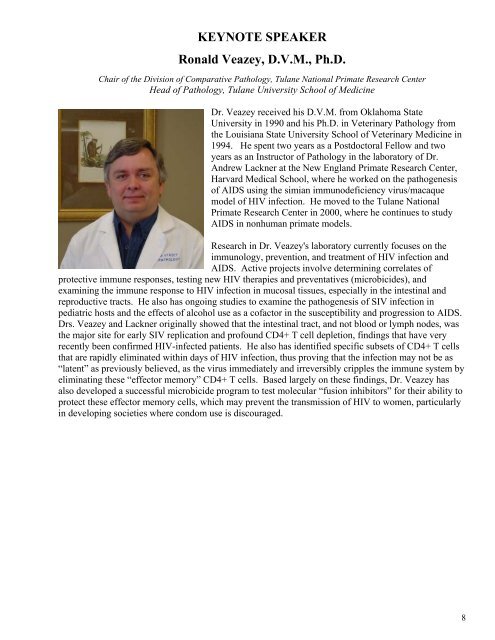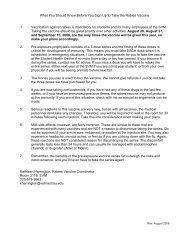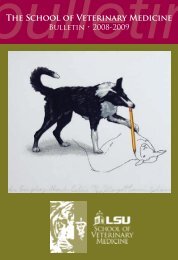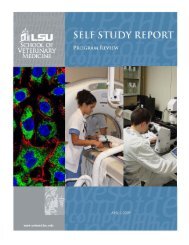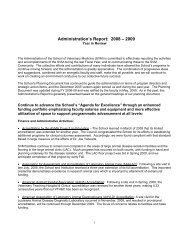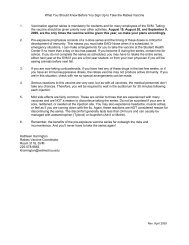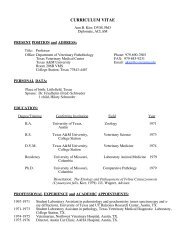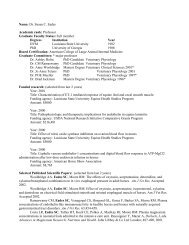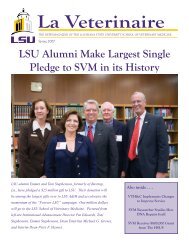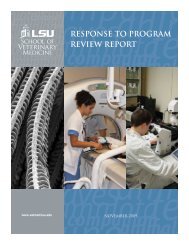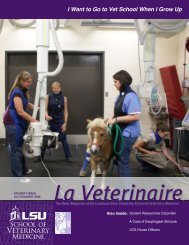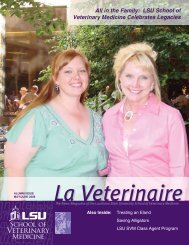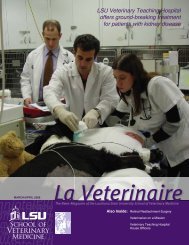2006 merck/merial - School of Veterinary Medicine - Louisiana State ...
2006 merck/merial - School of Veterinary Medicine - Louisiana State ...
2006 merck/merial - School of Veterinary Medicine - Louisiana State ...
You also want an ePaper? Increase the reach of your titles
YUMPU automatically turns print PDFs into web optimized ePapers that Google loves.
KEYNOTE SPEAKERRonald Veazey, D.V.M., Ph.D.Chair <strong>of</strong> the Division <strong>of</strong> Comparative Pathology, Tulane National Primate Research CenterHead <strong>of</strong> Pathology, Tulane University <strong>School</strong> <strong>of</strong> <strong>Medicine</strong>Dr. Veazey received his D.V.M. from Oklahoma <strong>State</strong>University in 1990 and his Ph.D. in <strong>Veterinary</strong> Pathology fromthe <strong>Louisiana</strong> <strong>State</strong> University <strong>School</strong> <strong>of</strong> <strong>Veterinary</strong> <strong>Medicine</strong> in1994. He spent two years as a Postdoctoral Fellow and twoyears as an Instructor <strong>of</strong> Pathology in the laboratory <strong>of</strong> Dr.Andrew Lackner at the New England Primate Research Center,Harvard Medical <strong>School</strong>, where he worked on the pathogenesis<strong>of</strong> AIDS using the simian immunodeficiency virus/macaquemodel <strong>of</strong> HIV infection. He moved to the Tulane NationalPrimate Research Center in 2000, where he continues to studyAIDS in nonhuman primate models.Research in Dr. Veazey's laboratory currently focuses on theimmunology, prevention, and treatment <strong>of</strong> HIV infection andAIDS. Active projects involve determining correlates <strong>of</strong>protective immune responses, testing new HIV therapies and preventatives (microbicides), andexamining the immune response to HIV infection in mucosal tissues, especially in the intestinal andreproductive tracts. He also has ongoing studies to examine the pathogenesis <strong>of</strong> SIV infection inpediatric hosts and the effects <strong>of</strong> alcohol use as a c<strong>of</strong>actor in the susceptibility and progression to AIDS.Drs. Veazey and Lackner originally showed that the intestinal tract, and not blood or lymph nodes, wasthe major site for early SIV replication and pr<strong>of</strong>ound CD4+ T cell depletion, findings that have veryrecently been confirmed HIV-infected patients. He also has identified specific subsets <strong>of</strong> CD4+ T cellsthat are rapidly eliminated within days <strong>of</strong> HIV infection, thus proving that the infection may not be as“latent” as previously believed, as the virus immediately and irreversibly cripples the immune system byeliminating these “effector memory” CD4+ T cells. Based largely on these findings, Dr. Veazey hasalso developed a successful microbicide program to test molecular “fusion inhibitors” for their ability toprotect these effector memory cells, which may prevent the transmission <strong>of</strong> HIV to women, particularlyin developing societies where condom use is discouraged.8


